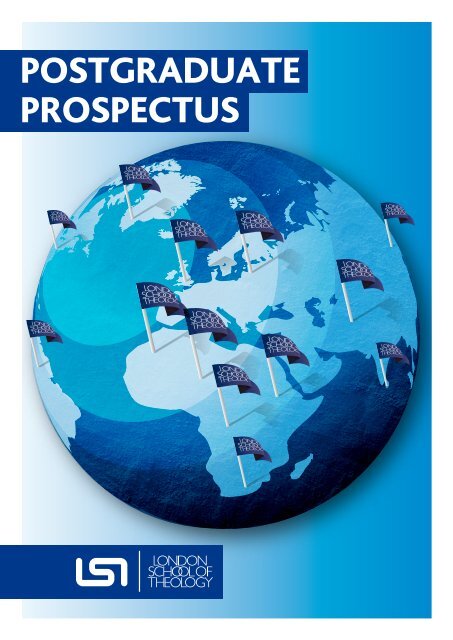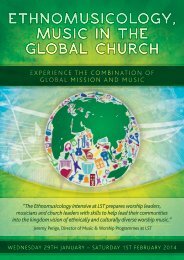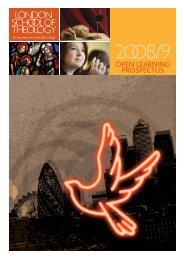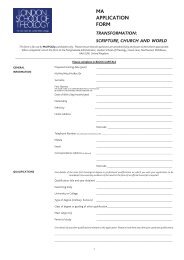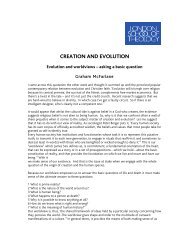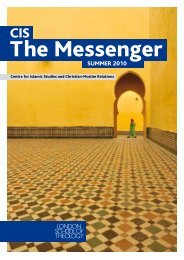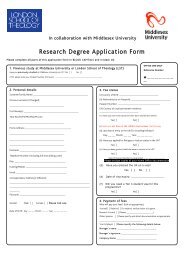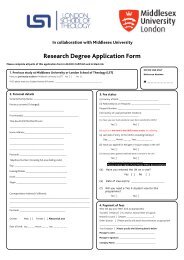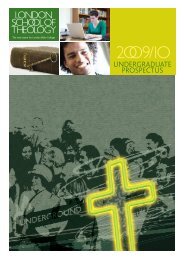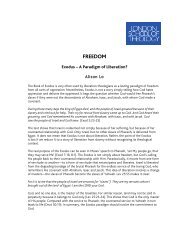POSTGRADUATE PROSPECTUS - London School of Theology
POSTGRADUATE PROSPECTUS - London School of Theology
POSTGRADUATE PROSPECTUS - London School of Theology
Create successful ePaper yourself
Turn your PDF publications into a flip-book with our unique Google optimized e-Paper software.
LST 03LST’s mission is to provideworld-class educationin theology and relateddisciplines to equip peopleto have a strategic influencefor Christ.We aim to work out thismission in four areas:through the Church, in theworld <strong>of</strong> education, acrosscultures and in the publicsquare.Who is LST for?Committed evangelical Christians from various church backgrounds, from the UK, therest <strong>of</strong> Europe and around the world.How do we equip students?By developing biblical and theological thinking to high levels, nurturing spiritual giftsand skills, and by encouraging personal spiritual growth.Through academic programmes, practical training, worship, community life, pastoralcare, and through service, scholarship, writing, speaking and by personal example.Postgraduate StudyPostgraduate study is exciting, enjoyable, stimulating and stretching! It equips youwith qualities <strong>of</strong> understanding, discovery, depth and determination. It enables youto teach others and make a positive difference in their lives. It opens up significantemployment opportunities in academia, Christian leadership and the pr<strong>of</strong>essionalworld. It enables you to research a topic you’re passionate about in considerabledepth – and to make a cutting-edge contribution to the Church and to scholarship.Each year up to 30 postgraduates graduate from LST to take up leadership roles allover the world. The majority <strong>of</strong> LST graduates can be found teaching in churches,seminaries and university faculties around the world. Many have gone on to publishtheir thesis and develop writing careers. Others are well-known public speakers anddenominational leaders, whilst some have even gone on to establish think-tanks orbecome diplomats. As part <strong>of</strong> a larger student body <strong>of</strong> over 350 students from acrossthe globe, <strong>of</strong> different ages and various church denominations, LST’s postgraduatecentre is a unique and exciting place to study.Delivering ExcellenceIn TheologicalEducationLST5642 - Postgraduate Prospectus revise v8REPRO.indd 3 12/08/2011 12:32
LST 04MA in Transformation:Scripture, Church andWorld“LST gave me amuch-needed spaceto reflect on mypractice in thelight <strong>of</strong> Scriptureand contemporaryculture and thisopportunityto researchtransformativelearning processeshas afforded megreater confidencein working to enabletransformationwithin my localchurch context.”Chloe Lynch 2009-2011God transforms the world through the Gospel. Back in the seventies,and again most recently in 2010, the Lausanne Covenant affirmed thatlife-giving power in individual lives, within the church and throughoutthe world. LST stands firmly within that tradition and the MA inTransformation: Scripture, Church and World seeks to equip graduatestudents both to experience themselves and to foster God’s work <strong>of</strong>transformation in others.Church and WorldAll students must choose at least one20-credit option that examines how theGospel transforms the church or worldin which we live.v Bible and Social Transformationv <strong>Theology</strong> and Social Transformationv Transforming ContemporaryApologeticsCOURSE CONTENTm The core module (40 credits)Christian Wisdom and Transformation:reading wisely, living wiselyThe core module demonstrates and engageshermeneutical tools for understanding thebiblical text well, and applying it to life. Itwill highlight the nature <strong>of</strong> biblical wisdom,the way it has been understood and applied,and its transforming effects in and throughthe life <strong>of</strong> the believer. As part <strong>of</strong> this coursethe student writes a reflective journal <strong>of</strong> theirexperience <strong>of</strong> the course. Assessment is byway <strong>of</strong> two essays <strong>of</strong> 3,000 words.m Optional modules 1 (to total 80 credits)In 2011-2012 the following options will be<strong>of</strong>fered:ScriptureAs transformative study <strong>of</strong> Scripture is at theheart <strong>of</strong> our evangelical understanding <strong>of</strong> thefaith, we make sure that you can choose upto three 20-credit options.v Mark’s Gospelv Holy Spirit in Luke/Acts and Paulv Exegesis <strong>of</strong> Greek Textsv Exegesis <strong>of</strong> Hebrew Texts1. No options will run which have less than five studentsinterested. The only exceptions are the Greek and Hebrewoptions for which only three students are necessary.Each optional module is assessed by anessay <strong>of</strong> 5,000 words.Dissertation (60 credits)MA candidates must complete adissertation <strong>of</strong> between 15,000 and20,000 words. The weighting <strong>of</strong> thedissertation recognises its significanceas an independent piece <strong>of</strong> work inwhich candidates apply methodologiesand skills mastered in other modulesto a topic <strong>of</strong> their own choice. It isthe climax <strong>of</strong> the course. Students areallocated a supervisor whom they seeregularly and who advises and guidesthem in the creation <strong>of</strong> a large-scalepiece <strong>of</strong> writing.LST5642 - Postgraduate Prospectus revise v8REPRO.indd 4 12/08/2011 12:32
LST 05Course LengthFull-time: 12 monthsPart-time: 2-3 years(first and second years usually1-day per week at LST, third year asnecessary for dissertation)DeliveryTeaching is normally in the form <strong>of</strong> seminars,most <strong>of</strong> which are led by students. Withample preparation and feedback this formsan important part <strong>of</strong> the students personaland academic growth. Whilst high academicstandards are a priority, we are alsocommitted to helping you grow spirituallyand experience the transformative impact <strong>of</strong>further study yourself. This process will beencouraged by pastoral letters and by tutorialconversation slots, designed to help youreflect on the ‘MA experience’ as it unfolds.The diverse nationalities, cultures anddenominations <strong>of</strong> students provide anenriching environment in which priorperspectives are challenged and broadened.Indeed, the programme encourages freedom<strong>of</strong> thought and the exploration <strong>of</strong> faith withina framework <strong>of</strong> trust in the authority andsufficiency <strong>of</strong> Scripture.A small number <strong>of</strong> lectures and periodicreflection on postgraduate study skills helpto supplement the learning process both ingeneral and as part <strong>of</strong> each module.“The MA course inTransformation hasequipped me to explorethe bible at a greaterdepth in both Hebrew andGreek, all the while askingquestions relating tohow it should be appliedto today’s cultural,economic, political andmissiological issues.”Wesley Chiang 2009-2011“Doing my MA at <strong>London</strong><strong>School</strong> <strong>of</strong> <strong>Theology</strong> gaveme skills that would haveotherwise taken me yearsto learn. The seminars anddiscussions taught me totake deep and complicatedconcepts and theories andarticulate them verballyand concisely. It gave methe confidence and abilityto express myself and knowthat I can contribute toscholarly debate.”Andre Adefope 2009-2010Entry RequirementsOur normal entry requirement is an uppersecond degree in <strong>Theology</strong> (UK) or equivalent(overseas). Applicants with degrees in anotherdiscipline, and who are able to demonstratean acceptable level <strong>of</strong> academic attainment intheology, may also be accepted.Research SeminarsMA students are encouraged to attend theresearch seminars organised throughout theyear for the MTh, MPhil and PhD students“The academic standardcombined with the closeknitcommunity <strong>of</strong>students and faculty onthe course has providedme far more than simplya degree; it has providedthe space in which tothink creatively andcritically within the‘transformation’ rubric,bridging the potentialacademic/practical divide.”Tim Goodall 2009-2011under the auspices <strong>of</strong> the Director <strong>of</strong> Research.They serve to create awareness <strong>of</strong> widerissues <strong>of</strong> concern in contemporary theologicalthinking, to sharpen research method, and toprovide a forum for research students to testtheir ideas.To find out more about the MA inTransformation please contact the courseleader by email MATRAN@lst.ac.uk. Foran application form please contact thePostgraduate Registrar PGRegistrar@lst.ac.ukor telephone +44 (0)1923 456162.LST5642 - Postgraduate Prospectus revise v8REPRO.indd 5 12/08/2011 12:32
LST 06MA in IntegrativePsychotherapyWith a focus on integrating Christianworldview and philosophyIntegrative Psychotherapy is now a well establishedmovement, with over 50% <strong>of</strong> counsellors describingthemselves as integrative, rather than holding an allegiancejust to one therapeutic approach. Our MA stands in thismovement, seeking to integrate Christian faith, theology,worldview and spirituality into the process and understanding<strong>of</strong> therapy. Find out what it might mean for you to be anintegrative therapist, with a well-founded understanding<strong>of</strong> your therapeutic practice, and <strong>of</strong> yourself, and <strong>of</strong> theChristian faith, and how they all fit together.As with our undergraduate programme in <strong>Theology</strong> &Counselling, the MA is a joint venture between LST and CWR.COURSE CONTENTThe course consists <strong>of</strong> two core modules(60-credits) and three optional modules(60-credits), culminating in the dissertation(60-credits). In line with other psychotherapycourses at Master’s level, you will alsobe expected to have your own personaltherapy (30 hours minimum) and to joinin a group process, exploring the impact<strong>of</strong> the experience as you move throughthe programme – so that you can becomeclearer about what it means for you to beintegrative.The core modules are at the heart <strong>of</strong> thecourse and will explore the integration <strong>of</strong> thepsychotherapeutic and theological literatureand emerging themes, particularly focusingon relationality and what this means for us intheology, in psychology, and in counselling.It will be a great opportunity to explore yourown underlying philosophy, anthropology andrelationality, and how these impact on yourclinical practice.Core modulesv Integrative Psychotherapy in ChristianPerspective: Being and Relating.v Integrative Psychotherapy in ChristianPerspective: Body, Mind and Story.Optional modulesv Psychotherapeutic Approaches toAddictions – drawing from theological,psychological and psychotherapy literature,this module will enable you to think abouttheories <strong>of</strong> change, and how to work ina psychotherapy context with clientsrecovering from various addictions.v Systems <strong>of</strong> Relationship – this modulefocuses on people in systems such ascouples, families and other groups. It willexplore systems from a theological andpsychological perspective, as well as helpyou apply different systemic theories inpractice.v The Use <strong>of</strong> Art in Therapy – this ‘handson’module will explore the use <strong>of</strong> art asa medium in the therapeutic process. Youwill engage in personal creative explorationwith different art materials and reflect onyour experience, referencing theologicalideas around human creative activity and aCreator God.v Contemporary Cognitive Approaches –this module aims to introduce you tosome <strong>of</strong> the newest developments incognitive approaches to therapy. It willcover approaches such as Mindfulness, theCognitive Behavioural Analysis System <strong>of</strong>Psychotherapy and Schema Therapy.DissertationThe dissertation will focus all <strong>of</strong> yourlearning onto the topic <strong>of</strong> your choice. Aswell as critically evaluating the relevantpsychotherapeutic and theological theories,you will reflect on the implications <strong>of</strong> thesefor your clinical practice and your ownintegrative philosophy. The word count forthe dissertation is 12,000-15,000 words. Youwill receive supervision at LST to support youin completing the dissertation module.Course LengthFull-time: 12 monthsPart-time: 2-3 years(usually 1 day per week at LST)COURSE DELIVERYThe optional modules, like the core modules,will be seminar based. You will contributeto your own learning by presenting some <strong>of</strong>the topics. As well as the more theoreticalelements, there will be a chance to learnthe application <strong>of</strong> skills through group work,demonstrations, discussion <strong>of</strong> your clinicalwork and other reflective exercises. Pleasenote: optional modules will run with aminimum <strong>of</strong> 5 students.LST5642 - Postgraduate Prospectus revise v8REPRO.indd 6 12/08/2011 12:32
LST 08Postgraduate Studies inTheological EducationEducation that is theological and pr<strong>of</strong>essional fortheological educators worldwideThis distinctive set <strong>of</strong> programmes represents a unique opportunityfor theological educators from all over the world to obtain muchdesired pr<strong>of</strong>essional training. It is no secret that teachers in Biblecolleges and seminaries all over the world are traditionally trainedin theology but not necessarily in education. LST is working togetherwith strategic international organisations involved in theologicaleducation to bridge this need and provide a series <strong>of</strong> highly flexibleand internationally deliverable courses in the discipline <strong>of</strong> theologicaleducation, from a foundational Postgraduate Certificate to a full MA.These programmes are for you if:v You are currently a theological educatorteaching in a Bible college or seminary;v You are a theology graduate who isconsidering a vocation in theologicaleducation;v You are involved in leadership or academicresponsibilities in a theological college, buthave not pr<strong>of</strong>essionally trained for theseroles;v You want to deepen you awareness <strong>of</strong>what is distinctive (and theological) abouttheological education and re-discover yourcalling.No need to leave your occupation, no needto leave your country. The programmes aredesigned in such a way that they are besttaken while you are actively teaching whereyou are. Short intensive study sessions during<strong>of</strong>f-semester times (either in <strong>London</strong> andpotentially, subject to approval, in other venuesworldwide) together with web-supporteddistance education are designed for men andwomen who are already involved in full-timetheological education anywhere in the world.The programmes may also be taken full-time,with residency at LST.How you will learnIn addition to learning through personal study,you will learn by engaging in practical activities,some <strong>of</strong> which will be shared with a cohort<strong>of</strong> students through the interactive coursewebsite. All the modules will be deliveredin such a way that you will be learning withfellow students from all over the world underthe guidance <strong>of</strong> a tutor. The intensives <strong>of</strong>feredduring the PGCertTE modules, will provide afurther opportunity to engage in an effectivelearning community atmosphere.Arrangements will also be made during theprogramme to be formally observed duringyour teaching in order to assist you in reflectingon your practice. Assessment will vary withinthe modules, with a significant weighting onreflective and critical essays.“I am thrilled about bridging solid academic theology with thestrong insights <strong>of</strong> theological education in methodology,pedagogy, and spiritual formation.”Dr Rolf Hille, Theological Commission WEAThree degrees: multiple entry and exitpoints for maximum flexibility:-PostgraduateCertificate inTheological Education(PGCertTE) (60 credits)The course consists <strong>of</strong> two 30-credit modules,delivered through a combination <strong>of</strong> distanceeducation and intensives over the course<strong>of</strong> a year. There are two possible startingdates (November and June). Each moduleis supported by a website with interactivefunctionality to provide class contact.v Perspectives in Theological Education(30 credits). This module provides anintroduction to the nature, purpose andproblems <strong>of</strong> theological education bothwithin the UK and internationally. It alsocritiques some contemporary and nearcontemporary debates and expressions <strong>of</strong>theological education, in order to elucidatekey ideas and practices, with the explicitintention <strong>of</strong> providing a basis for thestudent’s critical judgment on his or herpractice. In addition, it explores historicaland contemporary models and theoriesthat relate to the nature and role <strong>of</strong> thetheological educator in order to fosterthe development <strong>of</strong> practitioners that arepr<strong>of</strong>essional, reflective, holistic and maturing.v Philosophy and Practice <strong>of</strong> HigherEducation (30 credits). The aim <strong>of</strong> thismodule is to critically relate theory andpractice <strong>of</strong> higher education to theologicaleducation, on the understanding that thereis an undeniable relationship between thetwo domains. The module will provide ahistorical overview <strong>of</strong> higher education andintroduce students to the philosophy <strong>of</strong>higher education. In addition, students willcritically examine the theories, tasks andpractices <strong>of</strong> teaching and learning in highereducation with a view to develop bestpractice. Keeping a global audience in mind,students will be given the opportunity toinvestigate and critically analyse their ownhistorical, philosophical and pedagogicalcontexts.LST5642 - Postgraduate Prospectus revise v8REPRO.indd 8 12/08/2011 12:32
LST 09Summary diagramPostgraduate Degrees in Theological EducationPGCertTE (Intensive Modulesand Distance Education)Perspectives in TheologicalEducation (30)Philosophy and Practice <strong>of</strong>Higher Education (30)PGDipTE(Distance Education Modules)Two options from:Leadership and Management inTheological Education (30)Designing and Delivering EffectiveTheological Education (30)Spiritual Formation and CharacterEducation (30)MA in Theological Education(Distance Education Modules)Researching TheologicalEducation (60)60 CREDITS 120 CREDITS 180 CREDITSPostgraduate Diplomain TheologicalEducation (PGDipTE)(120 credits)In addition to the PGCertTE modules, studentswill take a further 60-credits delivered bydistance education over the course <strong>of</strong> a year.Distance education modules will start inNovember and June each lasting 5 months.The following three options are available.v Leadership and Management inTheological Education (30 credits). Thisoption is <strong>of</strong> interest to students involvedin positions <strong>of</strong> leadership, managementand administration within theologicalcolleges. The module will help developcritical knowledge and understanding <strong>of</strong>leadership, management and administrationin a variety <strong>of</strong> contexts and will fosterpr<strong>of</strong>essional abilities that cohere with theethos <strong>of</strong> theological education. In addition,the module aims to provide an overview<strong>of</strong> the purposes and practices <strong>of</strong> qualityassurance management.v Designing and Delivering EffectiveTheological Education (30 credits). Thismodule is designed for those who willbe designing courses and curricula andwish to effectively implement a variety <strong>of</strong>delivery forms, including distance learningthrough educational technology. The aim<strong>of</strong> the module is to develop knowledgeand understanding <strong>of</strong> curriculum modelsand theories, and <strong>of</strong> their relationship tocourse design and delivery methodologies,with the intention <strong>of</strong> fostering pr<strong>of</strong>essionalabilities in designing and deliveringeffective theological education. It is alsorich in practical application, as it seeks toprovide theoretical and practical instructionfor the development <strong>of</strong> effective andtransformative methodologies in theologicaleducation.v Spiritual Formation and CharacterEducation (30 credits). The aspect<strong>of</strong> educating for being and not onlyfor knowing and doing is an essentialcomponent <strong>of</strong> theological education, butone that has historically drifted into theextra curricular realm. This module willexplore themes and concepts <strong>of</strong> spiritualformation and character education, surveyhistorical patterns and recent literatureand seek out areas <strong>of</strong> application in thelife and vocation <strong>of</strong> a theological educator.The module will also give students theopportunity to explore key texts from therich heritage <strong>of</strong> literature within this field.MA in TheologicalEducation (180 credits)To be awarded the MA in TheologicalEducation, students must complete120-credits from the PGCertTE andPGDipTE as well as the following 60-creditresearch module:v Researching Theological Education(60 credits). This module explores theconcepts and principles that underpin theprocess <strong>of</strong> educational research. There isemphasis on developing the critical skillsthat will facilitate students in theirunderstanding, use and creation <strong>of</strong> researchwithin the context <strong>of</strong> theological education.The module will additionally provide studentswith the opportunity to develop specificresearch skills and will culminate with aresearch-based thesis within the field <strong>of</strong>theological education.Course LengthPGCertTE: Part-time 1 yearPGDipTE: Part-time 2 years, full-time 1 yearMA in Theological Education:Part-time 3-4 years, full-time 1 yearEntry RequirementsStudents enrolling in these postgraduateprogrammes are normally expected to havean honours degree in the field <strong>of</strong> theologyand to be engaged in the vocation <strong>of</strong>theological education.Imagine…Imagine knowledgeable and pr<strong>of</strong>essionaltheological educators all over the worldwho can work both autonomously andwithin teams in a variety <strong>of</strong> contexts.Imagine theological educators who canadapt to change and generate newideas in their particular cultures whileremaining faithful to the Biblical roots.Imagine theological educators who holdan integrated vision <strong>of</strong> holistic theologicaleducation and have taken responsibility todevelop pr<strong>of</strong>essionally and personally asmen and women <strong>of</strong> God, both in character,interpersonal skills and spirituality.We have imagined just these things.To find out more about PostgraduateTraining in Theological Education at LST,please contact the Course Leader by emaileducation@lst.ac.uk. For an applicationform please contact the PostgraduateAdministrator by email open@lst.ac.ukor telephone +44 (0)1923 456230.Validation andendorsementsThese programmes, validated by MiddlesexUniversity, have been developed through aclose working relationship with the EuropeanEvangelical Accrediting Association. They arealso warmly endorsed by key leaders involvedin theological education across the globe.LST5642 - Postgraduate Prospectus revise v8REPRO.indd 9 12/08/2011 12:32
LST 10MA Aspects AndImplications OfBiblical InterpretationWorld class teaching… at homeSince 2001 we have <strong>of</strong>fered the MA Aspects and Implications <strong>of</strong> BiblicalInterpretation entirely by distance education. Specifically designed withdistance education students in mind, the study material enables you toengage with a range <strong>of</strong> issues <strong>of</strong> exegesis and interpretation. Regularlyevaluated and revised it remains an innovative and challengingqualification to help prepare you for your next step.WHO IS IT FOR?The course is designed to help you upgradethe analytical and evaluative skills youacquired through your undergraduate studies.You will learn how to use these to relateScripture to the contemporary world as wellas to your own spirituality, past experienceand future ministry. It is especially relevantfor Christians in several different types <strong>of</strong>ministry and work:v Teachers and practitioners who want toupdate their knowledge and acquire skills <strong>of</strong>interpretation relevant to their roles.v Those engaged in, or preparing for,theological teaching in cross-cultural ormulti-faith contexts.v Theological graduates thinking aboutundertaking a research degree andwanting to develop their understanding <strong>of</strong>hermeneutics and biblical interpretation toMaster’s level.v Internationals who trained outside theUK but who want to gain a cross-culturalbenefit from the style <strong>of</strong> academicdiscipline in theology practised in the Britishuniversity system at postgraduate level.COURSE CONTENTThe programme consists <strong>of</strong> four parts: threemodules and a written dissertation <strong>of</strong>15,000-20,000 words.Core modulev HermeneuticsOptional modules(two <strong>of</strong> the following):v The Holy Spirit and Spiritual Giftsv <strong>Theology</strong> <strong>of</strong> the Poorv Old Testament <strong>Theology</strong> in Contextv Qur’anic and post-Qur’anic Interpretation<strong>of</strong> Biblical ThemesPlease note: if you do not wish to write a dissertation,you can discontinue your studies after completing thethree modules and leave with a Postgraduate Diplomaqualification.Course LengthUp to 3 yearsLST5642 - Postgraduate Prospectus revise v8REPRO.indd 10 12/08/2011 12:32
LST 11This programme focuses on the interpretation<strong>of</strong> biblical texts using a variety <strong>of</strong> tools andmethodologies in the fields <strong>of</strong> exegesis, literaryanalysis and hermeneutics.DissertationYour dissertation will demonstrate yourability to gather relevant data and applycritical powers <strong>of</strong> analysis and evaluation inan extended piece <strong>of</strong> writing, thus creating aplatform for further research.THE DISTANCE EDUCATIONEXPERIENCEKeeping in touchWherever you live, the Open LearningDepartment is fully equipped to work withyou, via email and telephone communication.You will be in regular contact with thedepartment, tutors, and other distance learningstudents. There are also optional study days tosupport you at all stages <strong>of</strong> the process.In addition, through the creation <strong>of</strong> onlineforums, it will be possible to interact withother students to discuss matters arisingfrom the study material.The course benefits from a dedicatedpart-time member <strong>of</strong> the faculty workingexclusively on this course.Studying by Distance EducationFor each module you will receive a studybook and a reader <strong>of</strong> photocopies fromrelevant books and journals. You will alsoneed to obtain copies <strong>of</strong> a number <strong>of</strong>specified textbooks for each module. Withthe assistance <strong>of</strong> a subject-specialist tutor,you will work through this material. Onoccasions, you will send sample materialfor evaluation by the tutor, and be able todiscuss your essays with them.AssessmentFor each module you will need to submita variety <strong>of</strong> written assignments, includingbook reviews, exegetical projects and essays.Assessment is done solely from this workand your dissertation. The department willdiscuss your particular working patterns andresponsibilities and set appropriate deadlines.Time CommitmentEach module requires 400 hours <strong>of</strong> studytime, typically spread out as 15 hours perweek, for up to 8 months <strong>of</strong> the year. Thiswill mean that you should complete eachprogramme within the time specified above.If you have more hours available each week,then you may be able to complete yourprogramme in less time. Alternatively, yourwork may allow you to spend concentratedperiods <strong>of</strong> a few weeks or months solely onstudy. Distance Learning is flexible enough toaccommodate this.There is also the advantage <strong>of</strong> up to twoyears abeyance on each programme, so if youare unable to complete part <strong>of</strong> your course,due to other commitments, you can leaveand come back to study at any given time.Entry requirementsA good theology degree from a recognisedinstitution will normally be required. Inexceptional cases mature candidates wholack formal qualifications may be accepted ifthey are able to show satisfactory evidence<strong>of</strong> relevant practical experience, together withan acceptable level <strong>of</strong> academic attainmentin theology.Please contact our Programme Leader byemail julie.robb@lst.ac.uk or telephone+44 (0)1923 456164 to request anapplication pack. This includes an applicationform, a description <strong>of</strong> the modules andinformation about a written interview whichasks you to respond to a number <strong>of</strong> promptsregarding the ‘ins and outs’ <strong>of</strong> studying at adistance. This interview takes the place <strong>of</strong> aface-to-face interview, which those applyingfor the on-site MA attend.Once you have filled in the applicationand responded to the written interview,please send these documents along witha £30 administrative fee to our AssistantRegistrar. We will process your application,and, if successful, will send you the materialfor the first module and put you in touchwith your tutors.Frequently askedquestionsWhat if my qualifications don’t fit?We have a range <strong>of</strong> preparatory coursesthat can be taken prior to the MA itself.Apply in the normal way, submittingtranscripts and any information thatyou think will help your application. TheProgramme Leader will then contact you todiscuss your situation and agree what wouldbe appropriate for you.Do I have to attend LST at any point?No. We realise that arranging to attend LSTregularly might be difficult for a number<strong>of</strong> people and there is no compulsoryattendance.However, there is normally the optionto attend LST at least once a year on aSaturday or for a weekend. Here youwill have the opportunity to meet otherdistance-learning students, tutors, theProgramme Leader and the Director<strong>of</strong> Open Learning. You will be able toparticipate in seminars similar to those heldfor on-site students, and make use <strong>of</strong> LST’slibrary facilities.Can I just do one module?You can enrol for single modules bydistance learning without registering forany <strong>of</strong> the awards. You would still have fullaccess to a tutor and the study events fordistance learning students. If you do notregister for the award, however, we cannotgive credit for your study.Use <strong>of</strong> email?Open Learning takes full advantage <strong>of</strong>the benefits <strong>of</strong> electronic communication.Several <strong>of</strong> our tutors are abroad and allwork submitted to and from them is sentelectronically. You will also be able tocontact other distance learning studentsand discuss the study with them. Essaysmust be submitted to LST by email.LST5642 - Postgraduate Prospectus revise v8REPRO.indd 11 12/08/2011 12:32
LST 12RESEARCH DEGREESResearch is about diggingdeep into a topic. The freshdiscoveries you make willcontribute both to yourpersonal growth and also tothe community you will beserving. A research degreeestablishes and demonstratesyour competence in thetheological discipline inwhich your thesis is beingsubmitted.In a research programme you willdemonstrate critical knowledge <strong>of</strong> the mainscholarly contributions to your chosen field.You will critically test hypotheses (includingyour own) by methods appropriate to yourdiscipline. You will write a comprehensiveand disciplined study <strong>of</strong> your topic, which willbe coherently structured and appropriatelyargued. Research degrees are not ‘taught’courses, although you may be asked to takea course <strong>of</strong> guided reading or attend somerelevant classes.SupervisionResearch students are assigned one or twosupervisors (the number <strong>of</strong> supervisorsdepends on your topic) who have expertisein the student’s topic, and will guide andadvise them in their research. Normallyyou will meet with your supervisor at leastfour times each year (two or three timesfor part-time students) to discuss at somelength written work previously submitted,and to talk through the way ahead. Allstudents are required to visit the <strong>School</strong>at least once a year. For students who liveat a great distance from LST (particularlyoutside the UK), supervision can beconducted by telephone, Skype or iChat,and contact can be maintained by email.Possible areas <strong>of</strong>researchThe lists below give an indication <strong>of</strong>the main areas <strong>of</strong> interest among ourresearch supervisors; look at the individualsupervisor pr<strong>of</strong>iles (pages 19-22) t<strong>of</strong>ind out each supervisor’s more specificinterests. Projects that fall outside the areasbelow will also be considered.Old TestamentExegesis and theology <strong>of</strong> the Pentateuch, theDeuteronomistic History, Wisdom literature,Hebrew poetry, Psalms, the propheticliterature; OT and biblical theology; OTinterpretation and hermeneutics; Hebrewlanguage; discourse analysis <strong>of</strong> OT texts.Supervisors: Jean-Marc Heimerdinger,Alison Lo, John Wilks.New TestamentCriticism and theology <strong>of</strong> Mark, Luke-Acts,John, the Pauline letters, Hebrews andRevelation; Pauline theology; NT theology,especially God, Christology, pneumatology,ecclesiology, missiology; aspects <strong>of</strong>New Testament hermeneutics (e.g. thecontribution <strong>of</strong> linguistics, use <strong>of</strong> the OTin the NT); historical Jesus studies; socialhistorical,sociological, narrative-criticaland theological approaches to the NewTestament; Greek language and linguistics;textual criticism.Supervisors: Max Turner, Conrad Gempf,Steve Motyer, Steve Walton, Julie Robb,William Atkinson, Robert Willoughby (MTh).LST5642 - Postgraduate Prospectus revise v8REPRO.indd 12 12/08/2011 12:32
LST 13Linguistics and biblicalstudiesDiscourse analysis; translation theory andpractice; contrastive linguistics.Supervisors: Max Turner, Jean-MarcHeimerdinger.Church history andhistorical theologyPatristics; Bernard <strong>of</strong> Clairvaux; Augustine;Reformation studies; Calvin; nineteenthcenturyScottish theology; twentieth-centurytheology; Walter Rauschenbusch; ReinholdNiebuhr; Jürgen Moltmann; Pentecostalismand charismatic Christianity; ecumenism.Supervisors: Tony Lane, Graham McFarlane,Paul Helm, William Atkinson, Michael Nazir-Ali.Systematic andphilosophical theologyTrinitarian theology; Christology; Holy Spirit;anthropology; soteriology and atonement;justification; original sin; ecclesiology;sacraments; Scripture and tradition;development <strong>of</strong> doctrine; personhood;aesthetics; theology and culture; modernity;post-modernity; theological education;Catholic-Protestant dialogue; theologicalmethod; Pentecostalism; pentecostaltheologies.Supervisors: Graham McFarlane, Tony Lane,Anna Robbins, Paul Helm, William Atkinson.Christian worship andpreachingPractice and theology <strong>of</strong> Christian worship;preaching and homiletics.Supervisors: Chris Jack (MTh), Peter Mead (MTh).Mission theology andhistoryHistory and theology <strong>of</strong> Christian mission;contemporary missiology; contextual theology.Supervisors: Andrew Kirk, Chris Wigram,Mark Beaumont, Michael Nazir-Ali.JudaismJewish biblical exegesis, ancient and modern;modern Jewish theology.Supervisor: Jean-Marc Heimerdinger.Islamics and ChristianMuslim relationsQur’anic studies; Sufism; prophethood; history<strong>of</strong> Islam; transmission <strong>of</strong> Islam to the Far East;Islamic radicalism; Christian Muslim relationsand apologetics; identity politics.Supervisors: Mark Beaumont, Sean Oliver-Dee, Keith Small, Michael Nazir-Ali.Applied theologyand ethics<strong>Theology</strong> and contemporary culture;personhood; ethical method; social ethics;ecumenical ethics; ethical dialogue; theologyand moral philosophy; medical ethics;Christian ministry, especially charismaticministries; issues related to mental health;women in ministry; Pentecostal distinctivesand practices, especially in the UK.Supervisors: Anna Robbins, GrahamMcFarlane, William Atkinson.“Both the personal interest and the pr<strong>of</strong>essional guidance whichmy supervisor, Pr<strong>of</strong>essor Tony Lane, has given in directing thedevelopment <strong>of</strong> my dissertation have made my experience with LSTone <strong>of</strong> my most enjoyable and productive educational ventures.”Tom Hawkes, Senior PastorLST5642 - Postgraduate Prospectus revise v8REPRO.indd 13 12/08/2011 12:32
LST 14RESEARCH DEGREESMTh – Master <strong>of</strong> <strong>Theology</strong>Full-time: 1-2 yearsPart-time: 2-3 yearsAssessment: Thesis <strong>of</strong> upto 40,000 words and oralexamination (viva)Who is it for?The degree is aimed at people with priortheological training – theology graduates,ministers and pastors, missionaries, ReligiousEducation teachers, and business people– as well as potential PhD students. It isparticularly suitable for those who cannotcommit themselves to the regular structure<strong>of</strong> a ‘taught’ Master’s course, or to the length<strong>of</strong> time necessary for a PhD.What is it about?The MTh is ideal if you want to dig deepinto one particular area rather than exploringthe wider variety <strong>of</strong> questions posed by a‘taught’ MA.It can provide a chance to reflect in moredepth on an experience you have had in yourjob or ministry, or for pastors, to address theircongregations with necessary expertise andcritical judgement.An MTh provides a solid apprenticeship inresearch and research writing for those whowish to progress to a PhD programme. Itis also excellent preparation for a future inteaching, writing and pastoral work.The MTh is a first research degree,combining training in research and writingskills. Candidates for this degree followa programme <strong>of</strong> study approved by theDirector <strong>of</strong> Research and write their thesison an approved topic in one <strong>of</strong> the majortheological disciplines. The thesis must bewell argued and be appropriately presentedwith clarity and conciseness <strong>of</strong> expression. Itis possible to transfer to MPhil (and then toPhD) registration with the agreement <strong>of</strong> thesupervisor(s) and Director <strong>of</strong> Research.Recent MTh thesesBridget Adams, Christ in the Market Place:Developing an Authentically Christian Model <strong>of</strong>Business ChaplaincyHeather Churchill, Who am I? A Reflection tothe Topic <strong>of</strong> Personhood from the Disciplines <strong>of</strong><strong>Theology</strong>, Psychology and NeuroscienceTim Creber, A Dialogue with NicholasWolterstorff: An Outline, Assessment andDevelopment <strong>of</strong> Some Key Aspects <strong>of</strong>Wolterstorff’s Thought in Relation to ReligiousBelief and BehaviourElizabeth Grove, Women in Islam: ScripturalPerspectives and Modern ArgumentsAkhtar Injeeli, Sufism and Military Jihad: ACritique <strong>of</strong> the Prevailing View <strong>of</strong> Non-violentand Pacifist SufismJonas Kurlburg, Aspects <strong>of</strong> Contemporary FreeChurch EcclesiologyKirk Poth, The Significance <strong>of</strong> the Church’sPrayer Life in Acts and its Role in Paraenesis andSalvation HistoryDennis Ray, Christians in Malaysia: A CriticalEvaluation <strong>of</strong> Their Religious Rights withSpecific Reference to the Islamic Legal Concept<strong>of</strong> DhimmaJoseph Sverker, The Holy Spirit and the icon:a critical consideration <strong>of</strong> Eastern Orthodox<strong>Theology</strong> <strong>of</strong> the icon in relation to OrthodoxPneumatologyMPhil – Master <strong>of</strong> PhilosophyFull-time: 2-3 yearsPart-time: 3-4 yearsAssessment: Thesis <strong>of</strong> upto 65,000 words and oralexamination (viva)Who is it for?Like the MTh, the MPhil is aimed at peoplewith prior theological training – theologygraduates, ministers and pastors, missionaries,Religious Education teachers, and businesspeople. The MPhil is particularly good forpastors wanting an opportunity to developor maintain a subject-expertise and itsrelated research skills, either while continuingin pastoral ministry or taking time out toresearch full-time.What is it about?An MPhil thesis <strong>of</strong>fers a careful and criticalinvestigation and evaluation <strong>of</strong> an approvedtopic, and demonstrates understanding <strong>of</strong>the research methods appropriate to yourchosen field. Your thesis does not need notto be ‘original’; however, it must demonstratethe ability to critique new ideas and a sense<strong>of</strong> proportion in evaluating evidence andscholarly interpretations. You are normallyexpected to read the language <strong>of</strong> yourprimary sources for an MPhil, but you arenot expected to engage with untranslatedsecondary literature.Recent MPhil thesesRosemary Ashley, An Investigation intoAuthority in the Church from a BiblicalPerspectiveKatarina Almonte, The Link betweenCharismatic Experiences and Revelation inJohn’s GospelBerhane Asmelash, The History <strong>of</strong> theKhatmiyyah Tariqah <strong>of</strong> Eritrea and the Impact<strong>of</strong> its Rituals and Ceremonials on Pre-existingBeliefs and Practices <strong>of</strong> the People <strong>of</strong> EritreaLST5642 - Postgraduate Prospectus revise v8REPRO.indd 14 12/08/2011 12:32
LST 15PhD – Doctor <strong>of</strong> PhilosophyFull-time: 3-5 yearsPart-time: 4-7 yearsAssessment: Thesis <strong>of</strong> upto 100,000 words and oralexamination (viva)Who is it for?The PhD is for people with prior theologicaltraining, usually to Master’s degree level, whowant to extend and increase their expertise.PhD graduates go on to many fields, includingtheological teaching in many parts <strong>of</strong> the world,church-based ministry, and senior leadership inchurches or Christian organisations.Why embark on a PhD?Doctoral research at LST involves work at thecutting edge <strong>of</strong> the theological disciplines. Youwill have the opportunity to furnish both theworldwide church and the academic communitywith expertise that will carry the best traditions<strong>of</strong> Christian scholarship into the next generationand enable you to teach at tertiary level.“Doing doctoral studies atLST from a long way away(Melbourne, Australia)was a challenging butrewarding experience.Throughout my studiesI appreciated theencouragement and wisdom<strong>of</strong> the LST staff, especiallymy supervisor who wasonly ever an email or Skypeconversation away. I wasvery grateful to have asupervisor who walked meexpertly through the manysteps between my initialnervous interview and finalsubmission, and beyond togetting my thesis published.”Peter Mallen, Director, DiscipleshipEducation, Centre for <strong>Theology</strong> andMinistry, Melbourne, AustraliaSummaryA PhD thesis will test ideas and investigatean approved topic critically. You need to <strong>of</strong>fera substantial fresh discovery or analysis, toargue some new critical hypothesis, or toprovide substantial new arguments for anolder one. Ultimately your research must resultin an independent and original contributionto knowledge which, in principle, is worthy<strong>of</strong> publication. By the time your thesis issubmitted, your competence in your chosenarea should be comparable with that <strong>of</strong> theexperts. PhD candidates have the ability tointeract with their primary sources in theoriginal languages (e.g. Hebrew or Greek)as well as with secondary material in themain research languages (English, Frenchand German). Languages required will varyconsiderably according to the area <strong>of</strong> studyand some may require no foreign languages.Recent published PhDthesesTimothy W. R. Churchill, Divine Initiativeand the Christology <strong>of</strong> the Damascus RoadEncounter (Pickwick, 2010)Rainer Schacke, Learning from Willow Creek?Church Services for Seekers in German MilieuContexts (Cuvillier Verlag, 2009)André Munzinger, Discerning the Spirits:Theological and Ethical Hermeneutics inPaul (SNTS monograph series; CambridgeUniversity Press, 2007)Hyung Dae Park, Finding Herem? A Study <strong>of</strong>Luke-Acts in the Light <strong>of</strong> Herem (Library <strong>of</strong> NTStudies; T&T Clark, 2007)Andy Partington, Church and State: theContribution <strong>of</strong> the Church <strong>of</strong> England Bishopsto the House <strong>of</strong> Lords during the Thatcher Years(Paternoster, 2006)Nicholas P. Lunn, Word Order Variation inBiblical Hebrew Poetry (Paternoster, 2006)Martin Parsons, Unveiling God: ContextualizingChristology for Islamic Culture (William CareyLibrary, 2005)Kiwoong Son, Zion Symbolism in Hebrews.Hebrews 12:18-24 as a Hermeneutical Key tothe Epistle (Paternoster, 2005)Sorin Sabou, Between Horror and Hope. Paul’sMetaphorical Language <strong>of</strong> ‘Death’ in Romans6:1-11 (Paternoster, 2005)Patrick Mitchel, Evangelicalism and NationalIdentity in Ulster, 1921-1998 (OxfordUniversity Press, 2003)Research entryrequirementsTo apply to study for an MTh or MPhil youshould have at least a good second classhonours degree (normally an upper second) ina theological, biblical or related subject, or aninternationally recognised equivalent. Fora North American Master’s degree, youshould have a GPA <strong>of</strong> at least 3.6 for theMTh and at least 3.8 for the MPhil. If youhave taken a second theological degree (e.g.a British MA in biblical or theological studies)you will find yourself much better equippedfor a research degree.If your degree is in some other discipline, youwill need to demonstrate theological studyequivalent to two years full-time study (BritishDipHE standard). Work experience can beconsidered in place <strong>of</strong> qualifications in somecircumstances.Candidates registered for the MTh or MPhil,whose work proves to be <strong>of</strong> the appropriatestandard may (with the agreement <strong>of</strong> theDirector <strong>of</strong> Research) transfer registration tothe MPhil or PhD.To apply to study for a PhD, entry requirementsare similar to the MTh and MPhil. You willinitially be registered for the MPhil with a viewto upgrade to PhD. Formal registration for PhDnormally takes place when you are about a year(<strong>of</strong> full-time study) away from its completion.Those seeking registration with qualificationsother than those indicated above shouldwrite to the Postgraduate Administrator at<strong>London</strong> <strong>School</strong> <strong>of</strong> <strong>Theology</strong>, giving full details<strong>of</strong> their qualifications and (where appropriate)providing photocopies <strong>of</strong> relevant transcripts.Full-time or part-timestudy hoursFull-time study involves approximately 45hours per week, with part-time study involving22 hours per week. The hours allow for around5 weeks <strong>of</strong> vacation each year.LST5642 - Postgraduate Prospectus revise v8REPRO.indd 15 12/08/2011 12:32
LST 16Life At LSTGuthrie CentreThe Donald Guthrie Centre for Biblicaland Theological Research houses thePostgraduate <strong>School</strong> <strong>of</strong> <strong>Theology</strong> forresearch students. Built in 1995 and namedafter a former Vice Principal, it providesresearch workstations, seminar roomsand IT facilities. Every desk has a networkpoint for Internet access, and a bookshelf.The common room is solely for the use <strong>of</strong>research students. The Guthrie Centre isalso the location for the Centre for IslamicStudies and Christian Muslim Relations andits specialist library.Centre for IslamicStudiesThe Centre for Islamic Studies (CIS) andChristian Muslim Relations was establishedover fifteen years ago. Since then it hasprovided teaching, tuition and supervisionto many <strong>of</strong> the <strong>School</strong>’s undergraduateand postgraduate students who anticipateinteracting with Muslims in many differentcontexts. The CIS also provides appropriateservices on a consultancy basis to Christianand corporate agencies engaged in theMuslim world. These services includeworkshops on Islam, cross-cultural strategiesand research reports.The CIS newsletter, the CIS Occasional PaperSeries and the Foundational Papers in IslamSeries are <strong>of</strong> great informative value to bothinternal and external audiences.The vision <strong>of</strong> the CIS is to serve the Church, tobe an effective and invaluable resource baseand to provide excellent academic trainingto students, churches, schools and individualswho want to increase their understanding <strong>of</strong>Islam and Christian Muslim relations.LibraryLST’s well-stocked library is housed inthe former chapel and holds over 50,000volumes. It is recognised as one <strong>of</strong> the bestspecialist theological libraries in the UK.The library receives some 200 periodicaltitles a year, and the ATLA Serialsdatabase enables students to access morethan 80,000 bibliographic citations fromall major theological journals since 1949.In many cases, full-text copies <strong>of</strong> articlescan also be downloaded. Another majorelectronic resource is the EBSCO Religion& Philosophy Collection, a database<strong>of</strong> electronic journals providing full-textaccess to articles published in nearly300 peer-reviewed academic journals inthe fields <strong>of</strong> theology, philosophy, worldreligions, ethics, biblical studies, religiousLST5642 - Postgraduate Prospectus revise v8REPRO.indd 16 12/08/2011 12:32
LST 17history, etc. Among the journals includedin the database are such major titles as‘Journal <strong>of</strong> Religion’, ‘International Journal<strong>of</strong> Systematic <strong>Theology</strong>’, ‘Church History’,‘Journal for the Scientific Study <strong>of</strong> Religion’and ‘Journal <strong>of</strong> Biblical Literature’. Thismakes it an essential tool for researchersand students <strong>of</strong> theology.The library <strong>of</strong>fers full wireless connectivityand there are also six computer publicterminals with Internet and email access.Photocopying facilities are also available.Other major research libraries – for examplethe British Library and SOAS in central<strong>London</strong>, the Bodleian in Oxford and TyndaleHouse in Cambridge – are not far away.Books and resourcesThe LST bookshop stocks a wide range <strong>of</strong>academic books, theological and otherwise,selected to meet your needs as a student.Our aim is to provide the books you requireas rapidly as possible. The shop usually holdsup to 2,000 titles. Items that are not in stockcan be ordered with many obtained within24 hours.Our upfront loyalty scheme <strong>of</strong>fers youexcellent value for money with a 10% bonuswhen you open a bookshop account with apayment <strong>of</strong> £50, and all registered studentsare entitled to a 25% discount on titlespublished by IVP. Other special <strong>of</strong>fers aremade available whenever possible.As well as books, we stock LST’s Christian Life&… DVD resource series for small groups,Christian music CDs, Traidcraft productsincluding chocolate, and greetings cards.For more information visitwww.lst.ac.uk/bookshopIT and CommunicationTelephone extensions and network pointsare installed in all rooms. The phone systemprovides resident students with their ownLST email account.If you are bringing your own computer, thereare Internet access points in the library,in your room (if you live on campus) andat your allocated desk (as a PG student).Wireless Internet access is available in thelibrary, the student centre and both Aldisand Mitchell residential houses. If you don’thave your own computer, there are publiccomputer terminals for use. There are nocharges for using the Internet as permanentaccess is included in your fees.LST has an Intranet site where studentsand staff can post and share information,both formal and informal. The Intranet isaccessible whether on or <strong>of</strong>f site and acts asa useful tool for the whole community. Manytutors make study materials available on theIntranet through the Forum area.Both full-time and part-time studentsshould consider purchasing a computer. Forwriting a complex academic dissertation withsplit footnotes, Hebrew and Greek fonts,automatically formatted bibliographies etc.we recommend a MAC, Windows or Unixmachine. You will also need word processingand anti-virus s<strong>of</strong>tware. We primarily useand recommend Apple computers, but ournetwork supports any up-to-date operatingsystem. Our IT team can provide advice oncomputer equipment as well as identifyingspecial deals once you’ve arrived.Student centre &recreationLST has a dedicated student centre which wasnewly refurbished in 2009 with TV lounges,a games room and a gym. Drink and snackmachines are regularly stocked and thestudent kitchen is available for making teaand c<strong>of</strong>fee.Within 5 miles <strong>of</strong> the campus, there aresquash and badminton courts, golf andsailing facilities and swimming pools.Social eventsThe academic year begins with the fun <strong>of</strong>Freshers’ week and ends with GraduationDay celebrations. In-between there aremany opportunities for socialising togetherand highlights include the 'Student Ball' and'Fun Week'. The LST community providesregular entertainment organised by thestudent committee.The Music & Worship department hostslunchtime recitals and evening concertscovering a wide range <strong>of</strong> music whichincludes opera, jazz, classical and featurespr<strong>of</strong>essional musicians.WorshipLife at LST centres around our faith in JesusChrist, and worship <strong>of</strong> him is at the heart <strong>of</strong>the studies, relationships and community life.As a culturally diverse group we appreciateand try to reflect the many different styles<strong>of</strong> worship that are represented. On a couple<strong>of</strong> occasions during the year we hold a QuietDay, a change from the normal timetable,taking time out to focus on God. The studentcommittee also organises opportunities forprayer and worship.LST5642 - Postgraduate Prospectus revise v8REPRO.indd 17 12/08/2011 12:33
LST 18Life At LSTPastoral CareStudying theology can be very challenging,personally and intellectually. To help withany pastoral and spiritual concerns you mighthave, qualified staff are available for you totalk to. For those who might need specialisedcounselling, this is available through WatfordChristian Counselling Service.DisabilitiesWe welcome applications from studentswith disabilities. We have served studentswith particular needs in the past and areanxious to meet all reasonable requirements<strong>of</strong> students with special needs. The groundfloor <strong>of</strong> Laing is accessible by wheelchair andwe have one purpose-built disabled accessbedroom with bathroom facilities adjacent.The best arrangement is for you to discussyour needs in advance with a member <strong>of</strong> staffand, if possible, arrange to visit LST so thata mutual assessment can take place. In thisway we can try to devise and agree a solutionthat will be tailor-made to your needs andour ability to provide. Please arrange adiscussion with our Disability Manager,Jenny Aston, on +44 (0)1923 456103 oremail jenny.aston@lst.ac.uk.AccommodationOnsiteThere are three halls <strong>of</strong> residence, each withits own character: Laing, Aldis and Mitchell– home to around 100 students duringterm time. The rooms are university-style,a mixture <strong>of</strong> single (approx 60) and twinbedded(approx 40) rooms with washbasins.All rooms are fully furnished and bed linenis provided weekly. Every floor has a kitchenand bath/shower facilities. There is also alaunderette on site.OffsiteFor married students, or those choosing tolive <strong>of</strong>f site, we keep an up-to-date list <strong>of</strong>registered properties available for rent. TheAssistant Registrar can <strong>of</strong>fer assistance infinding accommodation locally.There is no on-site crèche for children but wecan provide information about child mindingand day-care facilities in the area. Visitwww.hillingdon.gov.uk for local areainformation.NorthwoodLST is located in one <strong>of</strong> <strong>London</strong>’s greenand leafy suburbs yet it is only 30 minutesby Underground to Baker Street fromcentral <strong>London</strong>. You can enjoy the quietness<strong>of</strong> Northwood together with all that thecosmopolitan city has to <strong>of</strong>fer.As well as <strong>London</strong>, LST is within easyreach <strong>of</strong> Watford, St Albans, Windsor andOxford, giving a wide range <strong>of</strong> options forentertainment, culture, leisure and shopping.LST also has the advantage <strong>of</strong> being withineasy reach <strong>of</strong> the picturesque countryside <strong>of</strong>Hertfordshire and Buckinghamshire.Within Northwood there are all thefacilities you need for daily life, including asupermarket, chemists, baker, banks, c<strong>of</strong>feeshops, restaurants and pubs.There are several GP surgeries within a shortdistance <strong>of</strong> campus. There are also severaldental practices within a few miles, includingone in Northwood town centre.LST5642 - Postgraduate Prospectus revise v8REPRO.indd 18 12/08/2011 12:33
LST 19<strong>POSTGRADUATE</strong> FACULTYAND RESEARCH SUPERVISORSChris JackVice Principal and Lecturerin Applied <strong>Theology</strong>BA BD (<strong>London</strong>) MA (CNAA)Chris joined the faculty inSeptember 1997, but washimself a student, having gained his MA here in1986. A graduate in Modern Languages, Chris holds afirst class Honours BD from <strong>London</strong>, and is currentlyundertaking PhD studies at Cambridge. For sevenyears he was Principal <strong>of</strong> Romsey House TheologicalTraining College in Cambridge and has a wealth <strong>of</strong>experience in pastoral ministry. He previously workedin France with the European Christian Mission andcurrently serves on its British and InternationalBoards <strong>of</strong> Trustees. Both as a chaplain and in theclassroom Chris has a heart particularly for issues <strong>of</strong>pastoral care, spiritual development and worship.WilliamAtkinsonAssociate Research FellowMBChB (Edinburgh) MA(CNAA) PhD (Edinburgh)William worked briefly as adoctor before being ordained by Elim PentecostalChurch. He spent 10 years at Kensington Templein <strong>London</strong> and 10 years at Elim’s college, RegentsTheological College, where for 7 years he wasPrincipal. Since 2007, William has led the ElimPentecostal Church in Braintree, Essex. Williamearned his degree in medicine from EdinburghUniversity, an MA from LST and a PhD in theologyfrom Edinburgh. His PhD researched an aspect <strong>of</strong> theWord-faith movement.William is interested in supervising researchstudents in: the Word-faith movement andUS independent charismatic Christianity; andPentecostalism (especially British Pentecostalism).He is also interested in New Testament, especiallyMark, Luke-Acts, and Paul; Systematic theology,especially relating to Christ’s death/atonement andpneumatology; Pastoralia and ministry, especiallycharismatic ministries, issues relating to mentalhealth, and women in ministry; and Ecclesiology/religious studies, especially the social and ecclesialpositioning <strong>of</strong> pentecostal and charismatic groups.Mark BeaumontSenior Lecturer in Islamand MissionMA (Edinburgh) BD (<strong>London</strong>)PhD (Open University)After studying Philosophyand English literature at Edinburgh University and<strong>Theology</strong> at <strong>London</strong> Bible College Mark was Minister<strong>of</strong> Dennistoun Baptist Church in Glasgow for fiveyears. He became a member <strong>of</strong> Arab World Ministriesand taught ESOL in Casablanca, Morocco throughthe 1980s before becoming lecturer in Mission,Ethics and Historical <strong>Theology</strong> at Birmingham BibleInstitute, where he was involved in the validation<strong>of</strong> a BA in <strong>Theology</strong> and an MA in Mission inthe 1990s. His PhD from the Oxford Centre forMission Studies was subsequently published asChristology in Dialogue with Muslims in 2005. Hehas published journal articles and book chapters onChristian interpretation <strong>of</strong> the Qur’an, and Musliminterpretation <strong>of</strong> the Bible, and has contributedentries to the Encyclopedia <strong>of</strong> the Bible and itsReception on Muslim interpretations <strong>of</strong> Biblicalthemes. He is currently co-editing with MahaEl-Kaisy Friemuth <strong>of</strong> the Catholic University <strong>of</strong>Leuven a text and translation <strong>of</strong> a refutation <strong>of</strong> thedivinity <strong>of</strong> Christ attributed to al-Ghazali. He was avisiting lecturer in Missiology in India, in Christian-Muslim relations in Bosnia, and in Islamic Studies atBirmingham University.Mark’s research interests are in Christian relationswith Muslims, especially concerning Christology,the Trinity and Scripture; Muslim interpretation<strong>of</strong> Biblical themes and Christian interpretation <strong>of</strong>Qur’anic themes.He has been active in leading worship andpreaching in the Midlands and is a council member<strong>of</strong> Arab World Ministries UK.GrahamCHeesmanAssociate Research FellowBD (<strong>London</strong>) MPhil (CNAA)PhD (QUB)Graham was, until recently,the director <strong>of</strong> the Centre for Theological Educationin Belfast, before that, the principal <strong>of</strong> a biblecollege, a missionary and a pastor. He is a staffworker in Europe for the European EvangelicalAccrediting Association and has acted as lecturerand consultant in theological education in variousparts <strong>of</strong> the world. He has published three booksand a number <strong>of</strong> articles and is editor <strong>of</strong> onejournal and consulting editor <strong>of</strong> another, in thesubject <strong>of</strong> theological education.Graham is interested in supervising PhD and otherpostgraduate students in the area <strong>of</strong> theologicaleducation. He has supervised students in such areasas concepts in theological education, theologicaleducation and distance learning, training <strong>of</strong>missionaries, church and seminary relations, womenin theological education and contextualisation <strong>of</strong>theological education. He has especial knowledge<strong>of</strong> the European and African situations but hassupervised doctoral students from Europe, Africa,North America, India and the Far East. He greatlyenjoys supervising studies <strong>of</strong> a local situation intheological education, bring to bear on it ideas <strong>of</strong>good practice and good thinking in the subject.Conrad GempfLecturer in New TestamentAB (Gordon College) MTS(Boston) PhD (Aberdeen)Conrad was born andbrought up just outside NewYork City. He read for hisfirst degree at Gordon College, going on to takehis Masters at Boston University, before moving toScotland to do his PhD on the book <strong>of</strong> Acts underHoward Marshall. Conrad spent a post-doctoralyear at Cambridge and Tyndale house beforejoining LST in 1989 to lecture in New Testament.Conrad’s speciality areas are Mark, Luke, Actsand the backgrounds <strong>of</strong> the Pauline letters. Hehas acted as a translation/theological advisor tothe NIV Translation Committee, to Rob Lacey onhis translation <strong>of</strong> the gospels, and to Siku on theNew Testament <strong>of</strong> The Manga Bible. He has alsocontributed to, or edited a large number <strong>of</strong> booksand reference works, including IVP’s New BibleCommentary; The Dictionary <strong>of</strong> Paul and His Letters;The Book <strong>of</strong> Acts in its Graeco-Roman Setting andChristian Life & Today’s World.Jean-MarcHeimerdingerLecturer in Hebrew andJudaismBA (Strasbourg) M es L(Lyons) Deug in Hebrew(Lyons) PhD (Reading)Originally from Alsace, France, Jean-Marc teachescourses in Biblical Hebrew, Hebrew texts, DiscourseAnalysis <strong>of</strong> Biblical Texts and Judaism. He workedas a French teacher in France and West Africa andwas also pastor <strong>of</strong> a Baptist church in Lyons. Hedeveloped an interest in the Hebrew languagewhile working as a research assistant in thedepartment <strong>of</strong> Hebrew Studies at Lyons University.His work led to a PhD in Hebrew Linguistics atReading University. The thesis provides a linguisticanalysis <strong>of</strong> discourse features in Old Testamentnarratives.Jean-Marc’s Hebrew studies have also led to awider interest in Judaism, the role <strong>of</strong> the Biblein Jewish thought and the Jewish interpretation<strong>of</strong> the Bible. Jean-Marc’s main research interestsare the linguistic analysis and the exegesis <strong>of</strong> theHebrew Bible, but what matters most to him is todemonstrate the ongoing relevance <strong>of</strong> the HebrewScriptures in the life <strong>of</strong> faith and to link biblicalthought with spiritual life.LST5642 - Postgraduate Prospectus revise v8REPRO.indd 19 12/08/2011 12:33
LST 20Paul HelmAssociate Research FacultyBA MA (Oxon)Paul Helm was Pr<strong>of</strong>essor <strong>of</strong>History and Philosophy <strong>of</strong>Religion at King’s College,<strong>London</strong>, 1993-2000. Previous to that he was a Readerin Philosophy at the University <strong>of</strong> Liverpool, where hetaught for many years. He is now a Teaching Fellowat Regent College, Vancouver, where he was J.I.PackerPr<strong>of</strong>essor <strong>of</strong> Philosophical <strong>Theology</strong> 2001-5. He alsoteaches at the Highland Theological College.Paul is interested in supervising research studentsin Philosophy <strong>of</strong> Religion, Systematic <strong>Theology</strong> and<strong>Theology</strong> <strong>of</strong> the Reformation. Paul’s interests arein all aspects <strong>of</strong> philosophical theology and in anyChristian theological views that have philosophicalimplications. In particular, he is currently interestedin God’s relation to time (with reference to theories<strong>of</strong> the temporal order) and philosophical aspects <strong>of</strong>the ideas <strong>of</strong> John Calvin. He approaches these in anunabashedly analytic mode, and so his intellectualconnections and sympathies are more with ReformedOrthodoxy and medievalism than with modern‘continental’ philosophy.Andrew KirkAssociate Research FacultyBD (<strong>London</strong>) BA (Cantab)MPhil (<strong>London</strong>)AKC (King's College, <strong>London</strong>)Andrew’s whole workinglife has been in teaching at a postgraduate levelin different forms <strong>of</strong> adult education. He has wideexperience in teaching in a cross-cultural situation.His most recent teaching responsibilities have beenas a visiting lecturer in the MTh mission programme<strong>of</strong> the Protestant Institute for Mission Studiesin Budapest, in the MA in Contextual Missiologyprogramme <strong>of</strong> the International Baptist TheologicalSeminary (IBTS) in Prague and the MA programme<strong>of</strong> the Baptist Faculty, University <strong>of</strong> Bucharest.Andrew is interested in supervising research studentsdoing research in the field <strong>of</strong> Missiology, in particularissues to do with the <strong>Theology</strong> <strong>of</strong> Mission, theContextualisation <strong>of</strong> the Gospel, Witness in a SecularEnvironment, Apologetics, Interreligious matters(especially touching Islam and the West) and LatinAmerican <strong>Theology</strong> and Mission.Tony LanePr<strong>of</strong>essor <strong>of</strong> Historical<strong>Theology</strong>MA BD DD (Oxon)Tony studied Maths and<strong>Theology</strong> at Oxford andCambridge before joining LST’s faculty in 1973. Hehas remained here since, apart from a year awayspent teaching in Kenya and researching in the USA.In 2000 he was recognised by Brunel University asPr<strong>of</strong>essor <strong>of</strong> Historical <strong>Theology</strong> and in 2004 hewas awarded the degree <strong>of</strong> Doctor <strong>of</strong> Divinity byOxford University.An enthusiast for Christian doctrine, andespecially its history, Tony has the ability toexpress complex doctrinal concepts. His desireis for students to become more aware <strong>of</strong> theriches <strong>of</strong> the Christian heritage. For many yearsTony chaired the Tyndale Fellowship DoctrineGroup and he is one <strong>of</strong> the Presidium that runsfour-yearly international congresses on Calvinresearch. He has examined PhDs for variousuniversities, including Oxford, Cambridge, <strong>London</strong>and Edinburgh.Tony is interested in supervising students inhistorical theology. His prime specialisms areCalvin and Bernard <strong>of</strong> Clairvaux, though he hasalso supervised theses on other theologiansfrom the Early Church, the Middle Ages and thesixteenth and seventeenth centuries, as well asJürgen Moltmann. Theological themes that are<strong>of</strong> interest to him are especially Scripture andtradition, sin and grace, justification, sacramentsand Catholic-Protestant dialogue.Alison LoLecturer in Old TestamentBTh (Evangel Seminary,Hong Kong) MDiv (TrinityInternational University,Illinois) PhD (Glos)Alison was born and brought up in Hong Kong.She earned her PhD degree in Old Testamentfrom the University <strong>of</strong> Gloucestershire (2002).Alison was Visiting Scholar at the HebrewUniversity <strong>of</strong> Jerusalem (2003-2004), undertakingher post-doctoral research on Medieval JewishPerspective on Job 1-2. Before joining the facultyat LST, she taught at the Chinese University <strong>of</strong>Hong Kong (2004-2007).Alison’s area <strong>of</strong> special interest is in wisdomliterature, prophetic literature, and the Psalms.GrahamMcFarlaneBA Course Leader andSenior Lecturer inSystematic <strong>Theology</strong>BA MA (CNAA) Dip Ed(Glasgow) TQSE (RE) PhD (<strong>London</strong>)Graham lectures in Systematic <strong>Theology</strong>. Hetrained at LST (BA & MA), and taught RE for 4years before taking his PhD at King’s College(KQC) with Colin Gunton. He joined the <strong>School</strong>’sfaculty in 1990 as Lecturer in Systematic <strong>Theology</strong>and Assistant Director <strong>of</strong> Research. Graham enjoysencouraging people to think through their faith.Graham supervises research students in Systematic<strong>Theology</strong> from an Evangelical perspective. He isparticularly interested in atonement, hamartiology,relational theology which includes trinitariantheology, christology, pneumatology, theologicalanthropology and soteriology. His research interestin Edward Irving continues as well as interest inother nineteenth century Scottish theologians. Hehas successfully supervised to completion severalPhDs in Orthodox and Romanian theology. He hasa keen interest in contemporary culture and therelationship between theology, modern art and ourchanging culture.Peter MeadAssociate Research FellowBA (UWE Bristol) MDivMA (Multnomah BiblicalSeminary) DMin (Gordon-Conwell <strong>Theology</strong> Seminary)Peter serves as an International Minister withOperation Mobilisation and as a mentor in the CorDeo mentored training programme. He is also one<strong>of</strong> the Langham Preaching trainers. These rolesallow him to teach in Bible colleges, conferenceand mission events around the world. He is veryinvolved in the ministry <strong>of</strong> the local church.Peter is interested in supervising MTh researchstudents in homiletics. He is especially interestedin expository approaches to preaching, the role <strong>of</strong>preaching in spiritual formation, the interaction <strong>of</strong>preaching with hermeneutics and preaching thebiblical genres. Interests also include cross-culturalhomiletics, contemporary preaching, creativepreaching, theology <strong>of</strong> preaching and studies <strong>of</strong>preaching in the Bible (especially Hebrews assermon, and the speeches in Acts, as well as thepreaching <strong>of</strong> the OT prophets and Jesus).Steve Motyer<strong>Theology</strong> & CounsellingCourse Leader and Lecturerin New Testament andHermeneuticsMA (Cantab) MLitt (Bristol)PhD (<strong>London</strong>)Steve studied at Cambridge, Bristol, <strong>London</strong> andTubingen Universities and has written scholarlybooks on Romans 9-11, and the ‘Jews’ in John’sGospel. Recently his lifelong interest in hermeneuticshas extended into looking at the relationshipbetween psychology and theology, and he is trainingas a psychotherapist in connection with leading the<strong>Theology</strong> & Counselling programme at the <strong>School</strong>.Steve has a wide range <strong>of</strong> research interests,including John’s Gospel (both literature andtheology), Paul, Hebrews and Revelation in theNew Testament area, as well as Hermeneuticsand the interface between Christian theology andanthropology on the one hand, and contemporarypsychology and psychotherapy on the other. Withthis combination, it’s not surprising that he’s alsointerested in the impact <strong>of</strong> psychology on biblicalinterpretation, and in the ‘psychological’ reading <strong>of</strong>biblical texts!LST5642 - Postgraduate Prospectus revise v8REPRO.indd 20 12/08/2011 12:33
LST 21Bishop Michael JNazir-AliAssociate Research FacultyBA (Karachi) BLitt (Oxon)MLitt (Cantab) ThD (AustralianCollege <strong>of</strong> <strong>Theology</strong>, NSW)DD (Lambeth)Bishop Michael Nazir-Ali was the 106th Bishop <strong>of</strong>Rochester, for 15 years, until 1 September 2009.He is originally from Asia and was the first nonwhiteDiocesan Bishop in the Church <strong>of</strong> England.He was appointed in 1994. Before that he was theGeneral Secretary <strong>of</strong> CMS from 1989-1994. Heholds both British and Pakistani citizenship and from1999 was a member <strong>of</strong> the House <strong>of</strong> Lords wherehe was active in a number <strong>of</strong> areas <strong>of</strong> national andinternational concern. He has both a Christian anda Muslim family background and is now President <strong>of</strong>the Oxford Centre for Training, Research, Advocacyand Development (OXTRAD).Michael is interested in the following areas <strong>of</strong>research: Mission and Dialogue, Islam: history,Christian Muslim Relations, Sufism, Shari’a, AnglicanCommunion, Ecumenicalism especially Anglican-Roman Catholic Dialogue and United churches.SeanOliver-DeeAssociate Research FellowBA PGCE (<strong>London</strong>) MTh(Brunel) PhD (Middlesex)Sean completed his PhD inBritish engagement in issues <strong>of</strong> Islamic governancein the Summer 2008 at LST. Since then he hasworked freelance, writing papers for a politicalthink-tank and NGOs. He delivered the LST Level 3Islam in the Modern World course in 2007/8 andcontinues to take seminars and lectures on anoccasional basis at the <strong>School</strong>.In addition to his work at LST, Sean is also AssociateResearcher for the Anglican Representative to theEuropean Union. He is a regular consultant forgovernment on identity issues and has writtenseveral papers for NGOs and think-tanks and hisPhD was published by Rowman and Littlefield inAugust 2009.Sean is interested in supervising researchstudents in the field <strong>of</strong> Islamic identity andauthority issues. This could focus on the theology<strong>of</strong> authority and/or political theory. It could als<strong>of</strong>ocus on modern salafist philosophy, both in Indiaand in the Middle East. Sean’s own research hasexamined Western governmental engagementwith such Islamic governance as well as examiningquestions <strong>of</strong> citizenship and identity for bothChristians and Muslims.Janet PennyMA in IntegrativePsychotherapy CourseLeader, Lecturer inCounsellingBA Hons (Reading) MSc,PPDip (<strong>London</strong> Metropolitan)Janet is a Chartered Counselling Psychologistaccredited by the British Psychological Society andhas worked in the public sector with children andadults. She currently runs her own private practiceand is researching spirituality in psychotherapy.Janet is also involved with training GP Registrarsand teaches psychology as a Visiting Lecturer at theUniversity <strong>of</strong> Reading.Andre RadmallLecturer in CounsellingBA (Middlesex) MSc(Buckinghamshire)MA (Hertfordshire)Andre’s first training wasas a psychiatric nurse. Most <strong>of</strong> Andre’s careerhas been in the mental health field, working withsocial services, adolescent units and more recentlymanaging an eating disorders unit. Andre has trainedas a psychotherapist and started a successful privatepractice, studied theology and was ordained to theAnglican ministry as a voluntary curate.Andre’s research interests are in the fields <strong>of</strong>addiction psychology and the influence <strong>of</strong> narrativeon identity formation and relational systems.Julie RobbAcademic Advisor to the MAby Distance Learning andResearch SupervisorBSc (Cardiff) PGDip (Leeds) BAMTh (Brunel) PhD (<strong>London</strong>)Born into a Christian family, Julie first studiedBiochemistry, before qualifying and working as adietician in the NHS. Having come to LST to studytheology, she completed her doctoral studies in2003. Her particular interests are the use <strong>of</strong> theOT in the NT, the inter-testamental period, theGospels and Acts. She has been appointed a Bishop’sAdviser on Selection for the St Albans Diocese,has taught on their continuing ministry educationcourses and for the now defunct St Albans andOxford Ministry Course.Julie has written for Scripture Union in their‘Encounter with God’ series <strong>of</strong> Bible study notes, andwritten reviews for JSNT and Evangelical Quarterly.Julie is interested in supervising research in the NewTestament, particularly in Luke-Acts, Matthew, Johnand Jesus. She also has interests in Christology, biblicaltheology and hermeneutics, the use <strong>of</strong> the OT in theNT and in inter-testamental Judaism and the NT.Anna RobbinsSenior Lecturer in <strong>Theology</strong>and Contemporary StudiesBA (Carleton) MRE MA(Acadia) PhD (Wales)Anna came to faith in Christat a young age while growingup in Atlantic Canada. She studied political sciencein Ottawa, and after working for the Red CrossSociety, went on to study theology and serve inBaptist ministry in Nova Scotia before moving toWales to research Christian social ethics. She joinedLST’s faculty in 2000.Anna researches, writes, and speaks internationallyin the areas <strong>of</strong> social ethics, contemporary cultureand apologetics, challenging Christians to thinkclearly about living a biblically transformative faithin a rapidly-changing world.Anna supervises students in theology, ethics,and contemporary culture. In particular, she isinterested in ethical methodology, and the interfacebetween theology, contemporary thought andapologetical method. She has a specific interest inthe work <strong>of</strong> several theologians, including ReinholdNiebuhr, Walter Rauschensbusch, P.T. Forsyth, AlanP. F. Sell, and H. Richard Niebuhr. Her own researchis currently focused on the interface between ethicsand apologetics, and the relation <strong>of</strong> the individualto society in ethical practice.Keith SmallAssociate Research FellowBA (Western MichiganUniversity) ThM (DallasTheological Seminary)PhD (Brunel)Keith’s PhD was in Islamics, through LST. Dr Smallhas taught undergraduate and postgraduate levelsin Britain and internationally concerning Islamicsand Christian ministries to Muslims. In addition tohis academic credentials he has over twenty years<strong>of</strong> ministry experience to Muslims in the UK.Keith is interested in supervising research studentsin Qur’anic textual criticism, comparative textualcriticism between the New Testament and theQur’an, comparative topics concerning the Bibleand the Qur’an, and areas <strong>of</strong> comparative Islamicand Christian theology.LST5642 - Postgraduate Prospectus revise v8REPRO.indd 21 12/08/2011 12:33
LST 22WendySomervilleVisiting LecturerBA MSc MB ChB FRCPPrior to training in theologyand counselling Wendy wasa consultant physician involved in training doctorsand other pr<strong>of</strong>essionals in New Zealand and theUK. She is also a BACP accredited counsellor/psychotherapist, currently running a private practicewith adult individual and couple clients, andproviding counselling supervision for individuals andgroups. Research interests include the experience <strong>of</strong>counsellors and therapists in training.On our MA in Integrative Psychotherapy Wendyis involved in the vital task <strong>of</strong> accompanyingour students as they integrate their faith andtheology with their experience and understandingas therapists.Max TurnerPr<strong>of</strong>essor EmeritusMA PhD (Cantab) FRSAMax studied medicine andtheology at Cambridge andthen went on to completehis NT doctorate on Luke-Acts there. With theexception <strong>of</strong> a five-year secondment as lecturer inthe University <strong>of</strong> Aberdeen, he has been with LSTsince 1974. He returned from Aberdeen (1991)to become the Director <strong>of</strong> Research, then Vice-Principal (1996), and in 1998 became the <strong>School</strong>’sfirst lecturer to be recognised as Pr<strong>of</strong>essor.His major books are on the Holy Spirit (Power fromon High and The Holy Spirit and Spiritual Gifts). Hehas also written Linguistics and Biblical Interpretation(with Peter Cotterell). He has supervised tocompletion and publication some 15 doctoral theses,and greatly enjoys the relationships such projectsinvolve.Max, a Baptist minister, has been a regular speakerat church training/conference venues and amember <strong>of</strong> EA’s Committee for Unity and Truthamongst Evangelicals.Kate VineVisiting LecturerBA (Brunel) MA (Brunel) PgD(Hertfordshire)Kate is a State Registered ArtTherapist with the HealthPr<strong>of</strong>essions Council and is currently working inmainstream educational settings with children andyoung people. After initial studies in the visual artsshe gained postgraduate qualifications in theologybefore completing her pr<strong>of</strong>essional training in ArtTherapy. She has experience <strong>of</strong> working in the field<strong>of</strong> adult mental health and learning disability.On our MA in Integrative Psychotherapy Kateparticularly relishes the opportunity to bring thetwo sides <strong>of</strong> her career and interests together,coming in as a Visiting Lecturer to run the modulein the Use <strong>of</strong> Art in Therapy.Steve WaltonSenior Lecturer in Greekand New TestamentStudiesBSc (Birmingham) MA(Cantab) PhD (Sheffield)Steve served on a church staff, in student ministrywith UCCF, advised people on God’s call with theChurch Pastoral Aid Society, was a househusband,a bishop’s chaplain, and lectured at Bedford Collegeand St John’s College, Nottingham. He came to LSTin 1999.Steve’s passion is to help others engage with theNT for themselves. He is therefore an enthusiasticteacher <strong>of</strong> Greek. Steve is interested in supervisingresearch students in New Testament, particularlyin the theology and critical study <strong>of</strong> Luke andActs, Mark, Jesus, and Paul (particularly, but notexclusively, Philippians and 1 and 2 Thessalonians).He also has interests in textual criticism,NT understandings <strong>of</strong> God, Christology andpneumatology, theological readings <strong>of</strong> Scripture(including biblical theology and hermeneutics),narrative criticism, the appropriation <strong>of</strong> the OT inthe NT, Greek grammar and syntax, and has alsojoint-supervised theses in Christian Muslim issues.Chris WigramAssociate Research FellowBA MA (CNAA)PhD (The Netherlands)Chris has taught both Englishand Religious Educationat secondary level, and worked for OperationMobilisation with OM ships. He then servedwith OMF in the Philippines. Up until 2008, Chriswas OMF International’s UK Director. He is nowthe International Director for European ChristianMission International (ECMI). Chris is interestedin Mission Studies especially the interfacebetween the use <strong>of</strong> the Bible and mission, howinfluential the Bible has actually been in thepractice <strong>of</strong> mission. The hermeneutics <strong>of</strong> mission,how different parts <strong>of</strong> the world read the Bible,how these challenge western theology and theimplications <strong>of</strong> this for Christianity worldwide.John WilksDirector <strong>of</strong> Open LearningBA MA (Keele) BA (CNAA)PhD (OU)John’s call to Christianservice took the form <strong>of</strong> ashift in subjects rather than careers. Initially trainedin music, taking prizes in International competitionsfor orchestral composition, he subsequentlystudied theology at LST and St John’s College,Nottingham. Now an Old Testament specialist, hisresearch focused on the structure <strong>of</strong> Isaiah 40-55.He prefers to maintain a diverse range <strong>of</strong> interests,however, and is as preoccupied with subjects suchas contemporary opera and minimalism as withthe evolution/creation debate, male (hetero-)sexuality and the development <strong>of</strong> monotheismin Ancient Israel. He is the author <strong>of</strong> the ‘DeeperEncounter’ series, a six-volume set <strong>of</strong> small groupstudy notes published by Scripture Union, and one<strong>of</strong> the Editors for Evangelical Quarterly.RobertWilloughbyLecturer in New TestamentBA PGCE (Nottingham) BAMA (CNAA)Robert did his first degreein modern languages at Nottingham and went onto teach them at a large comprehensive school inDerby for four years. During this time he workedamongst Asian immigrants, which eventually ledhim to short-term service in India with OperationMobilization. He has served on several missionboards.A graduate <strong>of</strong> LST, Robert began teaching NewTestament here in 1984 and spent two yearsresearching John’s Gospel in Cambridge.Robert teaches the Bible and Social Transformationand <strong>Theology</strong> and Social Transformation on theMA course. He takes a keen interest in currentaffairs locally, nationally and internationally and isinvolved as much as time permits.Robert will consider supervising research into theNew Testament, especially into all aspects <strong>of</strong>the Gospels to MTh level. He is also interestedin supervising students in the field <strong>of</strong> social andpolitical theology, the theology <strong>of</strong> children and theinteraction <strong>of</strong> theology and the arts.LST5642 - Postgraduate Prospectus revise v8REPRO.indd 22 12/08/2011 12:33
LST 23ApplicationsHow to applyResearch programmes start in Octoberand January each year. The MA coursesstart in September. You should apply forthese at least four months in advance. Lateapplications are accepted, but your entry maybe delayed, particularly if you are applyingfrom outside the UK.If you would find it helpful, we can arrange aninformal interview. This gives you the chanceto talk with a member <strong>of</strong> staff, visit thecampus and discuss finance.You should complete the relevant applicationforms. There are separate forms for the MAsand research programmes, so please ensureyou have the correct form. All <strong>of</strong> the formscan be accessed on our website.All applications should be addressed to:Postgraduate Registrar, <strong>London</strong> <strong>School</strong> <strong>of</strong><strong>Theology</strong>, Green Lane, Northwood, HA6 2UW.Eligible applicants will normally beinterviewed either by a panel <strong>of</strong> tutors or apotential supervisor (not applicable to the MAby Distance Education).Do consider joining us for an Enquirers’ Dayto find out more about life and study at LST.Check out our website for the latest dates.FinanceAs well as tuition fees and living expenses,there are smaller costs to be aware <strong>of</strong>, suchas photocopying, examination fees and thesisbinding. You will also need a computer towrite up your thesis.The Directory <strong>of</strong> Grant Making Trusts is auseful resource for finding possible sources <strong>of</strong>support. However, there are very few grantsand scholarships available, and there is stiffcompetition for these.Visit our website for more information aboutfinance at www.lst.ac.uk.International studentsIf English is not your first language you willneed to arrange to take the British Council’sEnglish test. We cannot confirm your placeuntil you have produced an IELTS test reportand reached a score <strong>of</strong> 7.0 (all individualelements should be 6.5 or higher) or anequivalent English language pr<strong>of</strong>iciencyreport, i.e. TOEFL 600. There are many testcentres, easily sourced on the Internet. Yourpr<strong>of</strong>iciency in English will also be consideredduring your interview.International students should note that non-UK/EU passport holders are only admittedto the UK for full-time research, though, incertain circumstances and by agreement <strong>of</strong>the <strong>School</strong>, they may be able to undertakepart-time research while living outside the UK.If you are applying from outside the EU,we strongly advise that you submit yourapplication at least nine months ahead <strong>of</strong> theacademic year you wish to begin studies orno later than 30 April <strong>of</strong> the year <strong>of</strong> entry,as international applications take longer toprocess.We will also only be able to accept you whenyou can guarantee to meet the costs <strong>of</strong> yourstudies.If you are applying from a non-EU country,you won’t normally be permitted to take paidwork in the UK.LST is an accredited educational institutionwith the UK Border and ImmigrationAuthority. Students are therefore eligible tostudy in the UK as long as they successfullycomplete the LST application process andfulfil all other UK visa entry requirements. Forfurther details regarding study in the UK visitwww.ukba.home<strong>of</strong>fice.gov.uk/studyingintheuk/.Middlesex UniversityProgrammes currently running at<strong>London</strong> <strong>School</strong> <strong>of</strong> <strong>Theology</strong> arevalidated by Middlesex University.Visit www.mdx.ac.ukAmerican partnersA number <strong>of</strong> students at Asbury TheologicalSeminary (Kentucky), Gordon-ConwellTheological Seminary (Boston) and BethelSeminary (Minneapolis) in the USA areregistered for PhDs in collaboration with LST.ContactFor enquiries regarding all <strong>of</strong> our postgraduatecourses please contact the PostgraduateAdministrator on +44 (0)1923 456162 oremail PGRegistrar@lst.ac.uk.Be Filled With A Light That Won't FadeLST5642 - Postgraduate Prospectus revise v8REPRO.indd 23 12/08/2011 12:33
WELCOTEDREWYCOLD E N ELEGETheGrangeSchLSTG REFIRS WKE N LTHEGLENFOX DVANTAGEMSA N EWILFORDCLR OELLA DMYR TLESIDE C LOSEPDENE ROADB469TRINITY CLSuperstoreA S T BU R YNORTHWOODR ICK MA N S W ORTH ROADSTAAPPNorthwoodCollPHow to FIND US<strong>London</strong> <strong>School</strong> <strong>of</strong> <strong>Theology</strong>is situated in Northwood,30 minutes north west <strong>of</strong>central <strong>London</strong> by <strong>London</strong>Underground, and withineasy reach <strong>of</strong> the M1, M40,M25 and Heathrow Airport.For those using SatNav, usethe postcode HA6 2UZ.For detailed directions, visitwww.lst.ac.uk/directions.M40SloughM25M1HarlowEnfieldBrentwoodWatfordHarrowA1(M)M25DagenhamLONDONDartfordM11M25M2M4HeathrowCroydonM25BromleySevenoaksM20M3DorkingGuildfordGatwickM23<strong>London</strong> <strong>School</strong> <strong>of</strong> <strong>Theology</strong>Green Lane, Northwood, HA6 2UWDesign: Adept Designwww.adeptdesign.co.ukt +44 (0)1923 456000 e enquiries@lst.ac.ukf +44 (0)1923 456001 www.lst.ac.uk Registered Charity No. 312778Follow @LS<strong>Theology</strong>LST5642 - Postgraduate Prospectus revise v8REPRO.indd 24 12/08/2011 12:33


